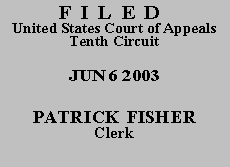

| ROBERT REID,
Plaintiff-Appellant, v. OKLAHOMA PARDON AND PAROLE BOARD; SUSAN BUSSEY, Chairman of Oklahoma State Pardon and Parole Board; OKLAHOMA DEPARTMENT OF CORRECTIONS; RON WARD, Director of Oklahoma Department of Corrections, Defendants-Appellees. |
|
Plaintiff brought this action under 42 U.S.C. § 1983 alleging that (1) the change in frequency of his parole reconsideration from annually to every three years violates the Ex Post Facto Clause of the Constitution, (2) defendants have failed to promulgate certain rules as required by statutory amendments to Oklahoma's parole procedures in the Truth in Sentencing Act, and (3) defendants have failed to comply with their obligations under 42 U.S.C. §§ 13701 and 13702, which condition a State's receipt of particular federal grants on the implementation of certain procedures by the State. In his complaint, he named as defendants the Oklahoma Pardon and Parole Board (OPPB) and the Department of Corrections (DOC). He also listed Susan Bussey as chairman of the OPPB and therefore "required to be served" and Ron Ward as acting director of DOC and also "required to be served." R., Doc. 1 at 1-2. He sought declaratory and injunctive relief, asking for "[a] due process procedure for determining what sentence he would have received for his crime" and "some measure of constitutional protection in connection with parole and/or commutation for release and/or discharge of sentence" based on a 1997 change in Oklahoma's sentencing laws. Id. at 8.
Defendants filed a motion to dismiss and/or for summary judgment, accompanied by a special report as ordered by the court. See Martinez v. Aaron, 570 F.2d 317 (10th Cir. 1978). Defendants argued that (1) plaintiff had failed to exhaust prison administrative remedies, as required by 42 U.S.C. § 1997e(a); (2) the named defendants are agencies of the State and therefore protected from suit by the Eleventh Amendment; (3) the individual defendants were named in their official capacities and therefore also immune; (4) plaintiff failed to allege any personal participation by defendants Bussey and Ward; (5) plaintiff's right to be free from Ex Post Facto laws was not violated by the change to his parole eligibility dates; and (6) defendants did not fail to follow the appropriate statutes because the Truth in Sentencing Act matrices are inapplicable to prisoners such as plaintiff who are convicted of first-degree murder.
In his report and recommendation, the magistrate judge recommended granting defendants' motion to dismiss/summary judgment without prejudice as to plaintiff's claims against defendants Bussey and Ward for failure to exhaust administrative remedies as required by 42 U.S.C. § 1997e(a) and with prejudice as to the balance of plaintiff's claims as barred under the Eleventh Amendment. Following de novo review, the district court concurred with the magistrate judge's determination that plaintiff's action against the state agencies is barred under the Eleventh Amendment. The court further determined that neither defendant Bussey nor defendant Ward were properly named or served, and therefore there was no action pending against them. The court then granted defendants' motion to dismiss and dismissed the entire action without prejudice.
On appeal, plaintiff argues that there are no administrative remedies available, within either the OPPB or the DOC, and that defendants are not protected by the Eleventh Amendment. Aplt. Opening Br. at 7-8.
We review de novo the district court's decision dismissing this action based on Eleventh Amendment immunity. See Joseph A. ex rel. Corrine Wolfe v. Ingram, 275 F.3d 1253, 1259 (10th Cir. 2002). We affirm.
We agree with the district court that the individual defendants were not properly named or served, in either an official or personal capacity. First, they were not named in the complaint other than the individuals "required to be served" in order to effect service on the agency defendants. R., Doc. 1 at 1-2. Second, they are not alleged as having committed any acts in violation of plaintiff's constitutional rights. Finally in his certificates of service, praecipe for summons, and summonses, plaintiff clearly named these individuals only as agents for service of the complaint on the agencies.
We further agree that plaintiff's claims against OPPB and DOC are barred by the Eleventh Amendment. State agencies, as well as States, are entitled to Eleventh Amendment immunity. Hefley v. Textron, Inc., 713 F.2d 1487, 1493 (10th Cir. 1983); Will v. Mich. Dep't of State Police, 491 U.S. 58, 70 (1989). This is not a situation in which Congress has abrogated the state's Eleventh Amendment immunity, nor one in which the state has consented to be sued. See Ruiz v. McDonnell, 299 F.3d 1173, 1181 (10th Cir. 2002), cert. denied, 123 S. Ct. 1908 (2003). Therefore, the State and its agencies are immune from this suit regardless of the relief sought. ANR Pipeline Co. v. Lafaver, 150 F.3d 1178, 1187 (10th Cir. 1998) (barring any form of relief against state agency, even solely prospective injunctive relief). Because this action is barred, we need not address exhaustion issues.
Accordingly, the judgment of the United States District Court for the Western District of Oklahomais AFFIRMED. The mandate shall issue forthwith.
Entered for the Court
Circuit Judge
*. This order and judgment is not binding precedent, except under the doctrines of law of the case, res judicata, and collateral estoppel. The court generally disfavors the citation of orders and judgments; nevertheless, an order and judgment may be cited under the terms and conditions of 10th Cir. R. 36.3.